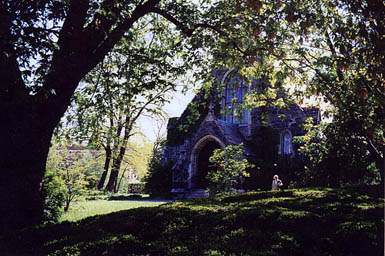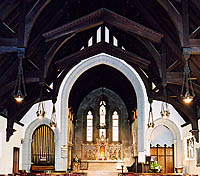
![]()
 |
||
 |
 |
 |
About the Chapel
THE PLACE
The Chapel is located on the fringe of Harvard Square, intellectual hub
of the renowned university and commercial center of a city of 100,000.
Landmark protection granted in 1999 recognizes the church’s unique
architectural, cultural, and social history.
Designed in 1901 by H. Langford Warren (founder of the adjacent Harvard
School of Architecture and a Swedenborgian himself), the building represents
an important example of Late English Gothic Revival style. To its neighbors
the Chapel represents a welcome vestige of open space and peaceful feelings,
an image of stability amid change.
While landmarking protects the picturesque exterior from demolition, nothing prevents conversion of the equally historic interior to secular use. That space is richly appointed in the 19th century Arts and Crafts Movement style championed by William Morris and Oscar Wilde. Hand-carved pews and altar, wrought-iron fixtures, and floor tiles glazed with symbolic patterns are some of the earmarks. The popular movement, dissatisfied with industrialization, encouraged such individualism in design and execution.
THE PRINCIPLES
Swedenborgianism is both a religion and a school of thought. "All
religion relates to life, and the life of religion is to do good,"
is high among the precepts of its founder Emanuel
Swedenborg, early 18th century Swedish scientist, philosopher, and
Christian mystic. “Buddha of the North,” he has been called
(by D.T. Suzuki). Putting its principles into practice, the Chapel has
open doors to all spiritual seekers. Says its new pastor Sarah Buteux,
“This faith invites you in as you are without knocking you over the
head with what you should be.”